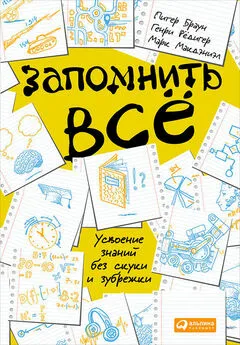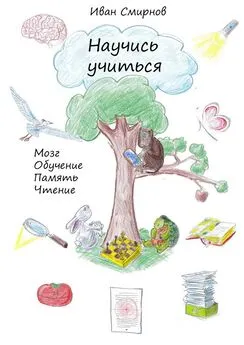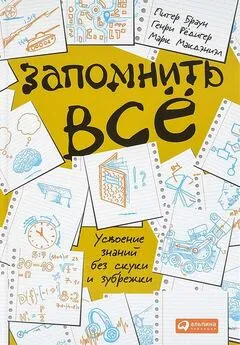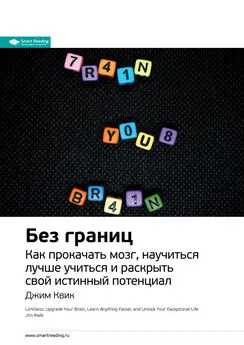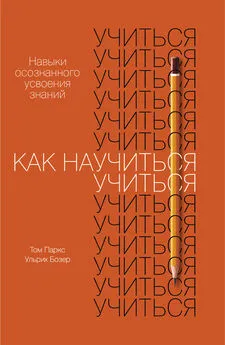Ульрих Бозер - Как научиться учиться [Навыки осознанного усвоения знаний]
- Название:Как научиться учиться [Навыки осознанного усвоения знаний]
- Автор:
- Жанр:
- Издательство:Альпина Паблишер
- Год:2020
- Город:Москва
- ISBN:978-5-9614-3365-4
- Рейтинг:
- Избранное:Добавить в избранное
-
Отзывы:
-
Ваша оценка:
Ульрих Бозер - Как научиться учиться [Навыки осознанного усвоения знаний] краткое содержание
Как научиться учиться [Навыки осознанного усвоения знаний] - читать онлайн бесплатно ознакомительный отрывок
Интервал:
Закладка:
14. Maria Konnikova, Mastermind: How to Think Like Sherlock Holmes (New York: Penguin, 2013). Метод извлечения со стопкой карточек описан в: Rachel Adragna, «Be Your Own Teacher: How to Study with Flash Cards», The Learning Scientists , February 20, 2016, http://www.learningscientists.org/blog/2016/2/20-1(дата обращения: 13.09.2016).
15. Более подробно о работах Ху: Yuzheng Hu et al., «Enhanced White Matter Tracts Integrity in Children with Abacus Training», Human Brain Mapping 32, no. 1 (2011): 10–21, doi:10.1002/hbm.20996.
16. О пластичности головного мозга в последние годы написано много, в том числе: S. Kühn, T. Gleich, R. C. Lorenz, U. Lindenberger, and J. Gallinat, «Playing Super Mario Induces Structural Brain Plasticity: Gray Matter Changes Resulting from Training with a Commercial Video Game», Molecular Psychiatry 19, no. 2 (February 2014): 265–71, doi:10.1038/mp.2013.120.
17. Martin Lövdén et al., «A Theoretical Framework for the Study of Adult Cognitive Plasticity», Psychological Bulletin 136, no. 4 (2010): 659. Также см.: Edward Taub, «Foreword for Neuroplasticity and Neurorehabilitation», Frontiers Research Topics: Neuroplasticity and Neurorehabilitation 8, no. 544 (2014): 4–5.
18. Пример со столицей Австралии привел мне Беннет Шварц. Психологи называют это явление «эффект гиперкоррекции». Более подробно см.: Janet Metcalfe and David Miele, «Hypercorrection of High Confidence Errors: Prior Testing Both Enhances Delayed Performance and Blocks the Return of the Errors», Journal of Applied Research in Memory and Cognition 3, no. 3 (2014): 189–197.
19. Amy Goldstein, «A Sine of a True Genius», Washington Post, June 7, 1989, https://www.washingtonpost.com/archive/local/1989/06/07/a-sine-of-a-true-genius/a29172c8-d53f-45da-920c-4e2a407ce97e/(дата обращения: 13.09.2016). Также см.: Jordan Ellenberg, How Not to Be Wrong: The Power of Mathematical Thinking (New York: Penguin, 2015).
20. Lisa Trahan, Karla K. Stuebing, Merril K. Hiscock, and Jack M. Fletcher, «The Flynn Effect: A Meta-Analysis», Psychological Bulletin 140, no. 5 (2014): 1332–60, doi: 10.1037/a0037173.
21. Kathryn Schulz, Being Wrong: Adventures in the Margin of Error , Kindle edition (New York: HarperCollins, 2010).
22. Dave Kindred, «Born to Be Players, Born to the Moment», Washington Post, February 23, 1980, http://www.washingtonpost.com/wp-srv/sports/longterm/olympics1998/history/memories/80-kindred.htm(дата обращения: 16.09.2016). По поводу точности цитаты ведутся дискуссии, см.: Bill Littlefield, «Hollywood Scores a 'Miracle' with Locker Room Speech», WBUR, June 18, 2016, http://www.wbur.org/onlyagame/2016/06/17/us-miracle-olympics-herb-brooks-origins(дата обращения: 16.09.2016).
23. Подробности эксперимента с пастилой: Walter Mischel, The Marshmallow Test: Mastering Self-Control (Little, Brown, 2014). Исследование о разговоре с самим собой: Sanda Dolcos and Dolores Albarracin, «The Inner Speech of Behavioral Regulation: Intentions and Task Performance Strengthen When You Talk to Yourself as a You», European Journal of Social Psychology 44, no. 6 (October 1, 2014): 636–642, doi: 10.1002/ejsp.2048.
24. Adam Winsler, Louis Manfra, and Rafael M. Diaz, «'Should I Let Them Talk?' Private Speech and Task Performance Among Preschool Children with and without Behavior Problems», Early Childhood Research Quarterly 22, no. 2 (2007): 215–231. Я нашел это исследование через Pyschnet.
25. Carol Dweck, Mindset: The New Psychology of Success, How We Learn to Fulfill Our Potential, Kindle edition (New York: Ballantine Books, 2008). Мысль о небольшом влиянии слов в исследованиях Дуэк я почерпнул от BBC: «The Words That Could Unlock Your Child», BBC News, April 19, 2011, http://www.bbc.com/news/magazine-13128701(дата обращения: 04.10.2016).
26. Также использовано: Kyla Haimovitz and Carol S. Dweck, «What Predicts Children's Fixed and Growth Intelligence Mind-Sets? Not Their Parents' Views of Intelligence but Their Parents' Views of Failure», Psychological Science (2016): 0956797616639727.
27. «Herb Brooks Quotes», Herb Brooks Foundation, http://www.herbbrooksfoundation.com/page/show/740804-herb-brooks-quotes(дата обращения: 16.09.2016).
Brackett, Marc, et al. «Enhancing Academic Performance and Social and Emotional Competence with the RULER Feeling Words Curriculum.» Learning and Individual Differences 22, no. 2 (2012): 218–224.
Cheryan, Sapna, et al. «Designing Classrooms to Maximize Student Achievement.» Policy Insights from the Behavioral and Brain Sciences 1, no. 1 (2014): 4–12.
D'Mello, Sidney, et al. «Confusion Can Be Beneficial for Learning.» Learning and Instruction 29 (2014): 153–170.
Ellenberg, Jordan. «The Wrong Way to Treat Child Geniuses.» Wall Street Journal, May 30, 2014. http://www.wsj.com/articles/the-wrong-way-to-treat-child-geniuses-1401484790(дата обращения: 07.10.2016).
Ericsson, K. Anders. «Training History, Deliberate Practice and Elite Sports Performance: An Analysis in Response to Tucker and Collins Review — What Makes Champions?» British Journal of Sports Medicine 47, no. 9 (2013): 533–535.
Huelser, Barbie J., and Janet Metcalfe. «Making Related Errors Facilitates Learning, but Learners Do Not Know It.» Memory & Cognition 40, no. 4 (2012): 514–527.
Klein, Gary. Seeing What Others Don't: The Remarkable Ways We Gain Insights . Kindle edition. New York: Public Affairs, Perseus Books, 2013.
Klein, Gary, Neil Hintze, and David Saab. «Thinking Inside the Box: The ShadowBox Method for Cognitive Skill Development.» Proceedings of the 11th International Conference on Naturalistic Decision Making . Paris: Arpege Science Publishing, 2013.
Muenks, Katherine, David B. Miele, Geetha B. Ramani, Laura M. Stapleton, and Meredith L. Rowe. «Parental Beliefs about the Fixedness of Ability.» Journal of Applied Developmental Psychology 41 (November 2015): 78–89.
Peary, Gerald, ed. Quentin Tarantino: Interviews, Revised and Updated. Jackson: University Press of Mississippi, 2013.
Protzko, John, J. Aronson, and C. Blair. «How to Make a Young Child Smarter: Evidence from the Database of Raising Intelligence.» Perspectives on Psychological Science 8, no. 1 (2013): 25–40. doi:10.1177/ 1745691612462585.
Rios, Kimberly, Zhen Hadassah Cheng, Rebecca R. Totton, and Azim F. Shariff. «Negative Stereotypes Cause Christians to Underperform in and Disidentify with Science.» Social Psychological and Personality Science (2015): 1948550615598378.
Schmidt, Richard A., and Robert A. Bjork. «New Conceptualizations of Practice: Common Principles in Three Paradigms Suggest New Concepts for Training.» Psychological Science 3, no. 4 (1992): 207–17. doi: 10.1111/j.1467–9280.1992.tb00029.
Steele, Claude M., and Joshua Aronson. «Stereotype Threat and the Intellectual Test Performance of African Americans.» Journal of Personality and Social Psychology 69, no. 5 (1995): 797.
Steinberg, Laurence. Age of Opportunity: Lessons from the New Science of Adolescence . Kindle edition. New York: Houghton Mifflin Harcourt, 2014.
Yan, Veronica X., Khanh-Phuong Thai, and Robert A. Bjork. «Habits and Beliefs That Guide Self-Regulated Learning: Do They Vary with Mind-Set?» Journal of Applied Research in Memory and Cognition 3, no. 3 (2014): 140–152.
Глава 4
1. Рассказывая о Джексоне Поллоке, я опирался на информацию из многих книг, в том числе: Henry Adams, Tom and Jack: The Intertwined Lives of Thomas Hart Benton and Jackson Pollock (New York: Bloomsbury Press, 2009), Leonhard Emmerling, Jackson Pollock (Taschen: 2003), and Deborah Solomon, Jackson Pollock: A Biography (New York: Cooper Square Press, 1987).
2. Caroline A. Jones, «Eyesight alone: Clement Greenberg's modernism and the bureaucratization of the senses», University of Chicago Press, 2005. Цитата о «контролируемой случайности» — из биографии Эммерлинга. Цитата о «великом моменте»: Jackson Pollock, American Letters: 1927–1947 (Polity, 2011).
3. Jackson Pollock and Lee Krasner Papers, «David Alfaro Siqueiros Letter to Jackson Pollock, Sandy Pollock, and Harold Lehman, 1936 Dec», Archives of American Art, Smithsonian Institution, 2016, http://www.aaa.si.edu/collections/items/detail/david-alfaro-siqueiros-letter-to-jackson-pollock-sandy-pollock-and-harold-lehman-13785(дата обращения: 14.09.2016).
4. Anonymous, «Jackson Pollock; Is He the Greatest Living Painter in the United States?» LIFE , August 8, 1949.
5. Naifeh Steven and Gregory White Smith, Jackson Pollock: An American Saga (New York: CN Potter, 1989). Цитата о «хаосе» на той же странице — из Книги Соломона.
6. «Review: Drips, Dropped: Pollock and His Impact», New York Times, December 31, 2015.
7. Jennifer Ouellette, «Pollock's Fractals», Discover , November 1, 2011.
8. Ashley Kahn, Kind of Blue (London: Granta Publications, 2001). Я также цитирую и использую: Fred Kaplan, «Kind of Blue», Slate , August 17, 2009, http://www.slate.com/articles/arts/music_box/2009/08/kind_of_blue.html(дата обращения: 14.09.2016).
9. Keith Waters, The Studio Recordings of the Miles Davis Quintet, 1965-68 (New York: Oxford University Press, 2011).
10. Miles Davis and Quincy Troupe, Miles (New York: Simon & Schuster, 1990).
11. Claire E. Weinstein, «Training Students to Use Elaboration Learning Strategies», Contemporary Educational Psychology 7, no. 4 (1982): 301–11. Также см.: Michelene T. H. Chi et al., «Self-Explanations: How Students Study and Use Examples in Learning to Solve Problems», Cognitive Science 13, no. 2 (1989): 145–182.
12. Briana Mezuk et al., «Impact of Participating in a Policy Debate Program on Academic Achievement: Evidence from the Chicago Urban Debate League», Educational Research and Reviews 6, no. 9 (2011): 622–635.
13. Lauren B. Resnick, Education and Learning to Think (Washington, DC: National Academies, 1987).
14. Stephen Gorard, Nadia Siddiqui, and Beng Huat, Philosophy for Children: Evaluation Report and Executive Summary, July 2015 (London: Education Endowment Foundation, 2015).
Читать дальшеИнтервал:
Закладка:
![Обложка книги Ульрих Бозер - Как научиться учиться [Навыки осознанного усвоения знаний]](/books/1065368/ulrih-bozer-kak-nauchitsya-uchitsya-navyki-osoznan.webp)
